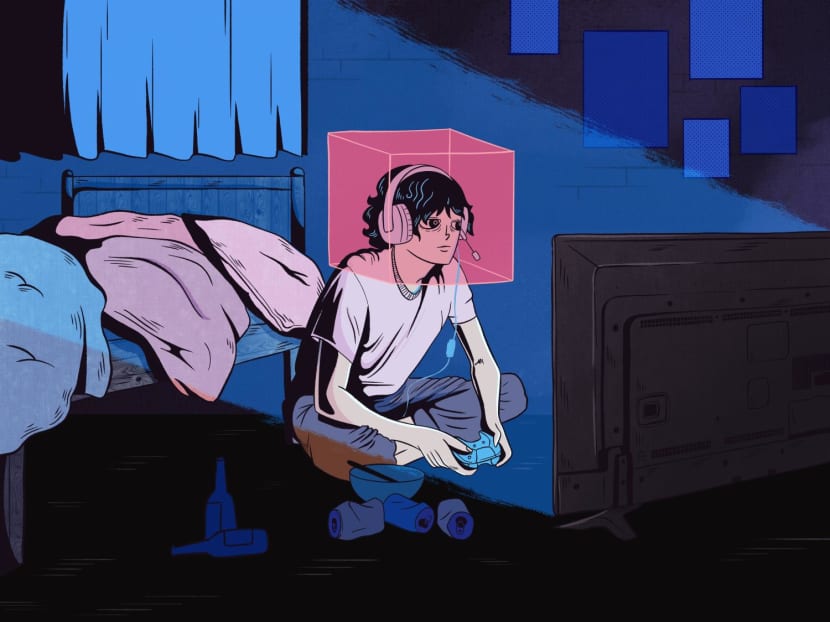'Eat, sleep, game': Hikikomori youths in Singapore need help to escape endless cycle of seclusion but solutions should tackle root causes
SINGAPORE — Aden was fifteen when he started isolating himself in July 2020, choosing to spend all his time at home playing games, eating and sleeping, or sitting along the corridor outside his family home.

- Hikikomori are individuals who have chosen to withdraw themselves from society
- Earlier in April, the South Korea government announced that it would offer a monthly allowance to its reclusive youths to encourage them to leave their homes
- Experts said such a move may offer relief to the youth, but will not tackle the root causes that led to their seclusion
- They pointed to the need for greater awareness of hikikomori to help families and the community better understand and support the individuals
- Building strong social relationships and community support are also key, they added
SINGAPORE — Aden was 15 when he started isolating himself in July 2020, choosing to spend all his time at home playing games, eating and sleeping, or sitting along the corridor outside his family home.
He frequently fought with his family and was hostile if he felt they were intruding his space.
While there was no specific incident that led to his isolation, he recalled how his mother had repeatedly made hurtful remarks, such as telling him he was worthless and good-for-nothing, and how he felt like he was just not good enough for his friends, or the world.
“I (kept) overthinking. I go out, then I think about what people (would) talk about me and all,” Aden (not his real name) told TODAY in a phone interview.
He added that overthinking such interactions, and having negative thoughts about his own worth and how people viewed him, really affected his self-confidence, which further hindered him from going out.
Later, with the support of volunteers from youth-based non-profit organisation Impart, he gradually rebuilt his confidence to leave his home in March 2021 — eight months after he had first caged himself in and became a “hikikomori”.
Now 18 and recovering from that part of his life, Aden could share candidly about his hikikomori experience, though he preferred using a pseudonym to protect his identity.
Hikikomori, or individuals who have chosen to withdraw from society, have recently come under the spotlight after the South Korean government earlier this month announced that it will offer a monthly allowance of 650,000 won (S$650) to reclusive youth between the ages of nine and 24, as a way to encourage them to leave their homes.
Around 350,000 South Koreans aged 19 to 39 are considered to be lonely or isolated, based on estimates by the Korea Institute for Health and Social Affairs.
First coined by Japanese psychiatrist Tamaki Saito in 1998, the term "hikikomori" is now used to describe adolescents or adults who withdraw from society, isolating and confining themselves largely to the walls of their homes for six months or longer.
While some of them, including Aden, eventually found their way back into society, others such as 17-year-old Isaac are still trying to break out of their self-imposed cage.
TODAY was unable to reach Isaac (not his real name) for an interview, but his mother was willing to talk about him on condition of anonymity. Her son had stopped going to school entirely in 2019 when he was in Secondary 1, after attending just six months of classes.
The 55-year-old security officer, who is also the family’s sole breadwinner, said: “I have to ask him every now and then what he wants to eat, or remind him to take a shower."
She added that he spent most of his waking hours at home playing online games.
Even after four heartbreaking years of seeing her son shut himself in, she still does not know, with certainty, the cause of her son's path towards seclusion, she told TODAY.
Perhaps he had been traumatised by the loan sharks who harassed them at home, after her stepson borrowed money from them years ago, or maybe it was because he was bullied by a fellow schoolmate in his secondary school. These incidents could have compounded her son's fear of leaving the house.
“I can see him, but he doesn’t want to speak, doesn’t want to say anything, (or talk about) why he doesn’t want to go to school,” she said.
NOT RECOGNISED AS A MENTAL CONDITION
Speaking to TODAY, psychologists and mental health professionals explained that the factors leading to self-imposed isolation are often multifaceted and differ from person to person.
However, they noted that there is usually an underlying pattern of past trauma, low self-esteem arising, and a lack of strong external networks of support.
Dr Liew Kongmeng, a cultural psychologist and psychology lecturer at the University of Canterbury in New Zealand, said that much research about the causes of the hikikomori condition has pointed towards societal pressures as a core factor.
“This could be children internalising pressures from parents to excel academically at school, or peer pressure, and then having a low view of self from not being able to meet these expectations.”
When faced with these pressures, some individuals may choose to escape, such as by emigrating overseas, or to rebel, by committing youth crime, for instance. A few may choose to withdraw from society completely and become hikikomoris, Dr Liew added.
Explaining further, Ms Lysia Tan, a clinical psychologist at Mind What Matters, said that children typically form a majority of committed and meaningful relationships during their formative years in school.
This is why factors that reduces one’s social network significantly, such as being bullied in school, or losing touch with family members after moving to a different city, add to the possibility of becoming a recluse, she said.
Mr Narasimman Tivasiha Mani, executive director of Impart, said that these young people often experience increased interpersonal relationship problems.
In any case, the hikikomori condition is not recognised as a psychiatric diagnosis, the experts said.
Ms Fionna Thong, the course chair from the diploma in psychology studies at Temasek Polytechnic’s School of Humanities and Social Sciences, said that it is not listed in the primary diagnostic manual used by mental health professionals in Singapore.
Instead, such a condition is a “culture-bound syndrome of social withdrawal”, she added. Therefore, mental health professionals here might classify individuals differently from other countries if they exhibit symptoms similar to the hikikomori.
Dr Praveen Nair, a psychologist and senior consultant at Raven Counselling & Consultancy, said: “Most individuals may end up attaining a diagnosis congruent with traditional mental disorders — such as mood disorders, anxiety disorders, personality disorders, developmental disorders, and even internet addiction or some phases of schizophrenia.”
COULD MONETARY INCENTIVES WORK?
In trying to solve this problem, could monetary incentives, such as what South Korea offers, help?
Several experts said that providing a financial allowance might offer some relief to the youth and help them find the means to re-enter society, but it could also backfire.
Ms Tan from Mind What Matters said that monetary benefits may ease financial pressures if they are struggling through a transition in life, helping to tide them over a rough period until they may stand on their feet again.
“Many times, depressive symptoms may be combated through an approach called behavioural activation, which includes scheduling activities in your life to help you regain momentum and motivation. The monetary benefit has been described to be a means for one to accomplish such activities,” she added.
However, Ms Tan acknowledged that it may also perpetuate the problem, since monetary benefits would not tackle the root cause of their seclusion.
Such financial support also risks entrenching hikikomori in their current lifestyles and could give them little motivation to seek out change, Dr Liew said.
The experts believe that the allowance may be useful, though, if accompanied by outcomes that can be tracked and can signify an improvement to the recluses' situations, such as participation in social activities, attending therapy or registering with a non-profit organisation.
This might provide the little push needed for them to leave their house, Dr Liew added.
MORE UNDERSTANDING AND AWARENESS NEEDED
What is more essential at the fundamental level is a greater awareness of the condition among families and the community, so as to help them better understand and support the hikikomori, the experts said.
“Unlike depression, which has clearer diagnostic criteria, hikikomori is still not something well-understood because there is a lack of epidemiological studies regarding the matter,” Dr Nair from Raven Counselling & Consultancy said.
“As such, for healthcare professionals and the government, the first step may be to conduct more research and awareness drives.”
Such awareness drives can serve to inform family and friends of some markers of hikikomori, which can help them spot the warning signs and encourage professional support, Dr Nair added.
Ms Thong from Temasek Polytechnic said that focusing efforts on increasing children and youth's engagement in school and the wider community, through various activities, is a helpful preventive method.
“Increasing mental health literacy of the general population can lead to earlier help-seeking, as problematic isolating behaviours can be identified earlier.”
Ultimately, “fear and avoidance are typically best met with approach and acceptance,” Ms Tan from Mind What Matters said. “Through building stronger social relationships in a gradual and non-coercive fashion, one may be able to slowly come out from one's comfort zone and state of withdrawal.”
Mr Narasimman from Impart said that individuals who do seek treatment are often offered clinical solutions such as medication, psychiatric help or psychological services. While crucial, he also underscored the importance of non-clinical approaches such as community support.
“I don't think that many of these youths take it very well when you just say, ‘Oh, you have to take these treatments’. But I think a community approach will help them to feel like they are empowered, like they are involved in their own care and that they are part of it,” Mr Narasimman said.
On this point, Aden recalled how he used to be angry at the volunteers from Impart, who kept trying to meet him every week. Yet it was through these same persistent weekly house visits that he eventually rebuilt his confidence.
When the volunteers realised that Aden enjoys cooking at home, one of them from the Impart team began teaching him how to bake every week. Impart was also able to secure donated baking equipment for him to use.
Gradually, they began encouraging him to leave the house by running short errands, such as buying ingredients from a shop beneath the housing block where he lived.
Today, Aden is also taking boxing classes with Impart and has enrolled in a barista course to learn how to brew coffee.
He hopes to work on building up his body and finding work, he said.
As for Isaac, he still spends most of his days at home, but his mother is hopeful about the progress he has made. She told TODAY that she and her son joined Impart for a recent event at Changi Beach.
“He never participates, he just sits down at one side,” his mother said. “But that’s the first time we have been out with the other kids since 2019.”
She added that she will not give up helping her son climb out of his shell.
“I will try my best as a parent, for his future. Hopefully, there is a chance for him to get on track to start his life, to be independent.”











